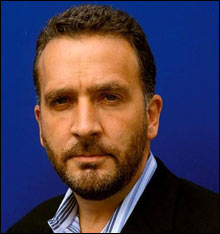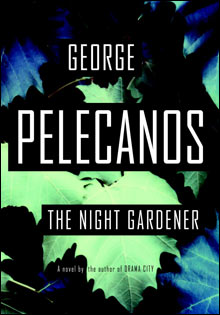
PLOT DEVICE: Pelecanos’s multi-strand narrative puts his characters — and us — in a tense, tight corner.
|
A couple of weeks back, in a small bar in Brooklyn, I witnessed an unlikely and wonderful collaboration. Crime novelist George Pelecanos read from The Night Gardener with musical accompaniment from veteran LA rocker Steve Wynn and his band the Miracle Three. Finding a rhythm within the music, Pelecanos clipped off phrases, walked a line between deadpan and understatement, allowing Wynn and his band to conjure up a noir atmosphere with coils of sound that were suddenly clamped down, shut off, as if they were rising smoke from a cigarette butt that someone had abruptly ground out with his shoe. No one pushed; the performance built slowly but forcefully to a place where dread and compassion were the same, the plane on which the band’s music met Pelecanos’s prose. It was like a less deliberately romantic version of what Charlie Haden and Quartet West conjure up in their performances of standards with interpolated bits of ’40s-movie dialogue and singers. It was also one of the best examples of literary criticism I’ve encountered in a while.
Hearing Pelecanos’s prose in such a noirish setting, one in which crime fiction could sound like mere atmosphere, emphasized how rigorously he’s avoided the clichés of noir. He is an ace plotter, and his multi-strand narratives work to narrow the space between his characters so that, by the end of the book, he’s put them and us in a tense, tight corner.
But by now it’s clear that he’s equally concerned with reportage. I don’t want to diminish the pleasure he gives or his craft. Pelecanos is one of the few hard-boiled writers in whose work spareness does not equal dumb macho stoicism. He is not a social worker who just happens to write novels. Yet without ever giving into agitprop or self-righteousness, he’s taken on the largely abandoned roles of novelist as muckraker and social critic. His evocations of inner-city Washington are not those of a tut-tutting tourist. He never forgets that people live in these neighborhoods and that, despite the crime and decay, life that most of us would recognize continues there. He extends compassion to those who merit it, and he doesn’t offer up phony excuses for the frighteningly blank characters who sometimes turn up in his pages.

|
In The Night Gardener, a police detective faces the possibility that a serial killer who terrorized the city when he was a rookie is back and killing again. His unlikely ally in the investigation is a former colleague, a guy who dropped out of the force under the threat of inquiry from internal affairs and now makes his living chauffeuring and kills the rest of his time drinking.
And that’s as much as I’m going to say about the plot, largely because you should have the pleasure of discovering it for yourself. But also because, as always in Pelecanos, the details are at least as important as the story. Here those details focus on the police detective’s family life, particularly his relationship with his teenage son as he finds the balance of keeping the boy on the straight and narrow while trusting him enough to allow him to steer his own course. No doubt Pelecanos, who has two sons, is drawing on his own experience here, and it’s one of the more believable portraits of family life in any recent American novel. That you might think it just an accumulation of familiar details only confirms the level Pelecanos is working on. As Pauline Kael once said of Gene Hackman, he’s so consistently believable, he’s always in danger of people saying he’s merely good.
The Night Gardener | By George Pelecanos | Little, Brown | 372 pages | $24.99